November Newsletter
Volume 2, Issue 11
November 1, 2021
Special Points of interest

State Director of Referee Development
Welcome to the November issue of the MRC newsletter. Fall soccer is almost over. It feels as though we just started our fall season. Some referees have attended the State Cup finals in Saginaw and Brighton. Many of you are working on high school and college games. I hope everyone is staying safe and healthy without any injuries.
We continue to offer several brand-new referee certification classes every month. As you will see below, we have some information about grassroots referee recertification for 2022. If you know anyone who wants to become a referee, please send them to this registration wizard. Also, if you have any special relations with a local referee association or a soccer team, you can ask if they would cover the cost of referee registration even partially to encourage more people to become referees.
As always, our November newsletter is full of exciting stories and information. We are featuring Kenny Nunez and Mike Wint in our interviews. They are both from the Grand Rapids area so if you are from the west side of the state, you may be familiar with them. They were both at the State Cup weekend early October. So some of you might have worked with them recently.
Of course, our monthly dog article is there again. We interviewed Luna and Lily DeBrabander. We also have some technical information. There is an article about misconducts, particularly the importance of categorizing them as physical, tactical, or technical. We have a few reports on referee training sessions, particularly from the State Cup weekend in Saginaw. For the first time, EVERYONE who submitted their answers to What is Your Call was able to answer correctly! Congratulations!
Inside this issue
Referee of the Month: Kenny Nunez
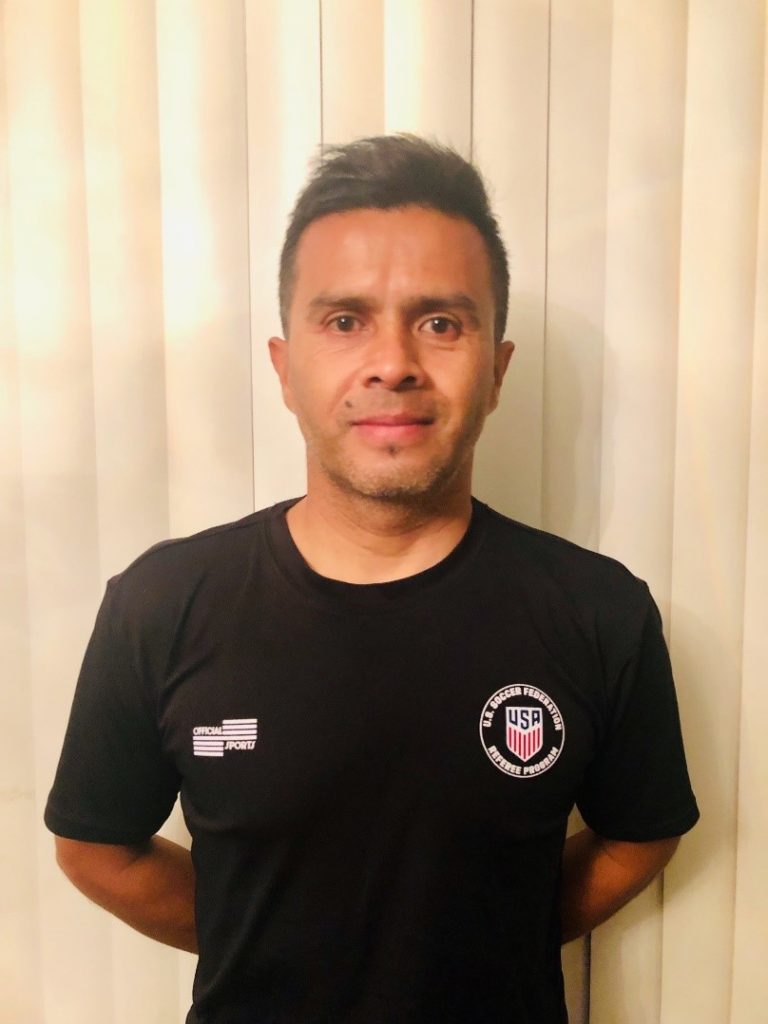
Grassroots Referee
Hello, my name is Kenny Nunez. I was born in Puerto Cortes, Honduras. I currently live in Grand Rapids. In 1997 a hurricane hit Honduras, leaving the country with little ability to recover, and I moved here in 1998 for a better future. I grew up in a family full of soccer players. I remember playing soccer since I was 7 years old. Since I was 21 years old, I was both playing and refereeing soccer in my free time. I have always liked refereeing since I was young, and I have always had good advisors. For example, in 1997, I assisted a clinic led by Argelio Sabillon, who was a FIFA referee. Since 1999 when I moved to Grand Rapids, I was refereeing in various local Hispanic soccer leagues. It was not until 2017 that I registered to referee with USSF.
Through USSF, I learned that I had to improve on many levels. Another thing that helped me was a clinic I attended in March 2019 with Felipe Ramos Rizo, who is also a FIFA referee. I am also registered with the National Futsal Premier League (NFPL), which is a semi-professional futsal league. These two organizations have helped me improve in many aspects, and they help me gain a lot of experience while keeping me busy as a referee. In the last two years I have learned a lot of new things about the game of soccer by being able to travel and seeing how diverse refereeing can be from futsal to soccer. I have also had the opportunity of meeting and learning from other referees. Some of the people that have helped me along my journey, mentored me, and advised me is Bill Howard, Jordan Howard, and Joshua Abts. With their knowledge, I have grown a lot and have had many new opportunities and improved on many levels. One of the best experiences being a referee is helping with important tournaments in the USSF. Being immersed in the USSF community has bettered my knowledge, and I hope to continue growing
Physical, Tactical, and Technical: What Are They?
Have you ever had a situation where you consider giving a yellow card but you decide to “manage” it without a card? There exists misunderstanding that a referee who gives fewer yellow cards is a better referee that someone who gives more. In reality, a good referee gives necessary yellow cards, while effectively preventing situations where they need to give unnecessary yellow cards. But what do “necessary yellow cards” and “unnecessary yellow cards” mean?
There are two types of yellow cards that a referee must issue. The first type is for a physical offence, namely a reckless challenge. If a player commits a reckless challenge, a yellow card must be given. Of course, there are some fouls that are borderline reckless. In that situation, the referee may use their discretion to give a yellow card or to manage without a card. However, when there is a clear reckless challenge, a yellow card must be given. “It is only the first minutes of the game,” “I don’t think I would get anything out of this card,” and other excuses are invalid.
The second type of offence for which a referee must issue a yellow card is tactical offence. Two best known tactical offences, probably, are DOGSO (denying an obvious goal scoring opportunity) and SPA (stopping of a promising attack). Another example that some of you may have heard about is so-called cynical holding. When such an offence happens, a card must be given. A referee must issue a yellow card for SPA at the first minute of the game or at the ninetieth minute of the game.
When these two offences happen, give a yellow card. The score, the time, the age, or any other factors do not matter. Even if it is second yellow card, it must be given.
The third kind of offences, namely technical offences, has some wiggle room. Think of dissent. As the referee, you may think that it is better not to give a yellow card. Of course, if dissent is public, provocative, and/or personal, a yellow card is needed. If players are mobbing the referee, a card (or cards) must be given. But for a lot of dissent situations, there is some wiggle room.
In some cases, even technical offences are so blatant that there is no room for management. If a player kicks the ball away by two yards right after you whistle, you don’t always have to give a card. Or, a player may kick the ball away by 10 yards but there may be a substitution going on. You do not want to ignore the incident, but you do not always have to give a card. “Did the player have time to think?” “How far did the player kick the ball?” and “Was the opposing team actually ready to restart the game?” are some of the considerations. If the answer is “yes” for all three, a card must be given. But if there is any doubt, the referee may manage the situation without a card.
Recognize the nature of an offence. If it is physical or tactical, do not hesitate to issue a card. Of course, if you are unsure if an offence was reckless, you may refrain from giving a card. But if you are sure that it was reckless or a cynical hold, you must give a card.
Field Training at State Cup
During the State Cup quarter and semi final weekend in Saginaw over 15 licensed referee mentors, coaches, and national coaches attended to mentor referees.
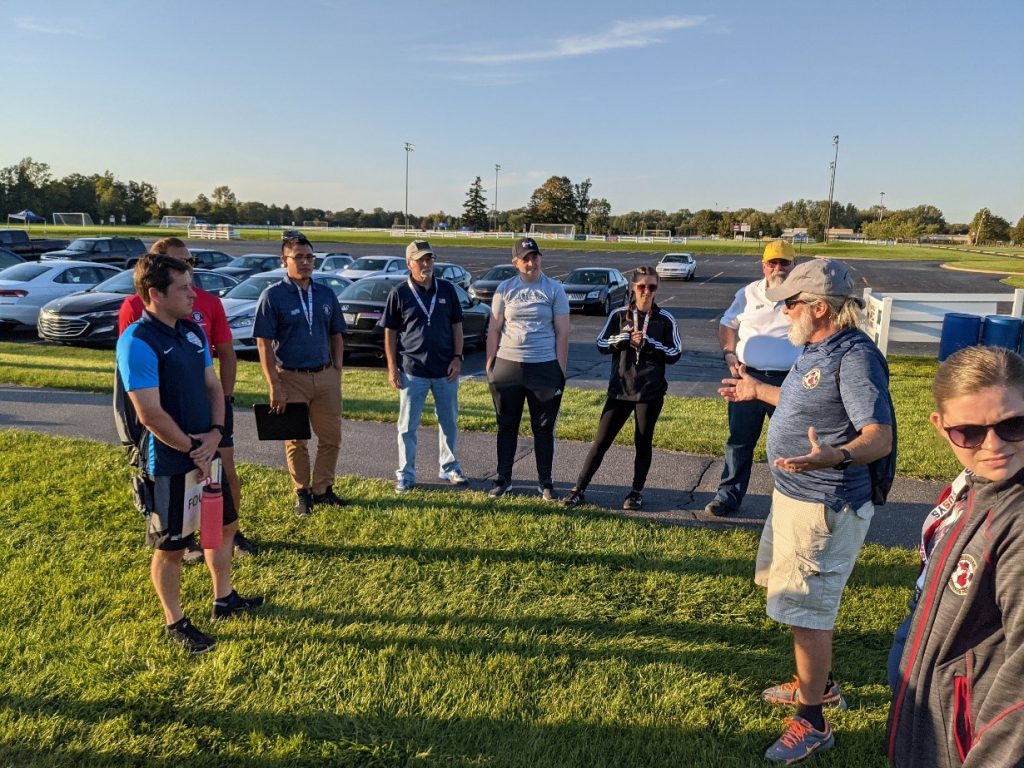
On Friday, we met at one of the fields to conduct a field session training. Kristy Bos and Dean Kimmith took leadership roles and worked with mentors to talk about dynamic positioning, teamwork, etc.
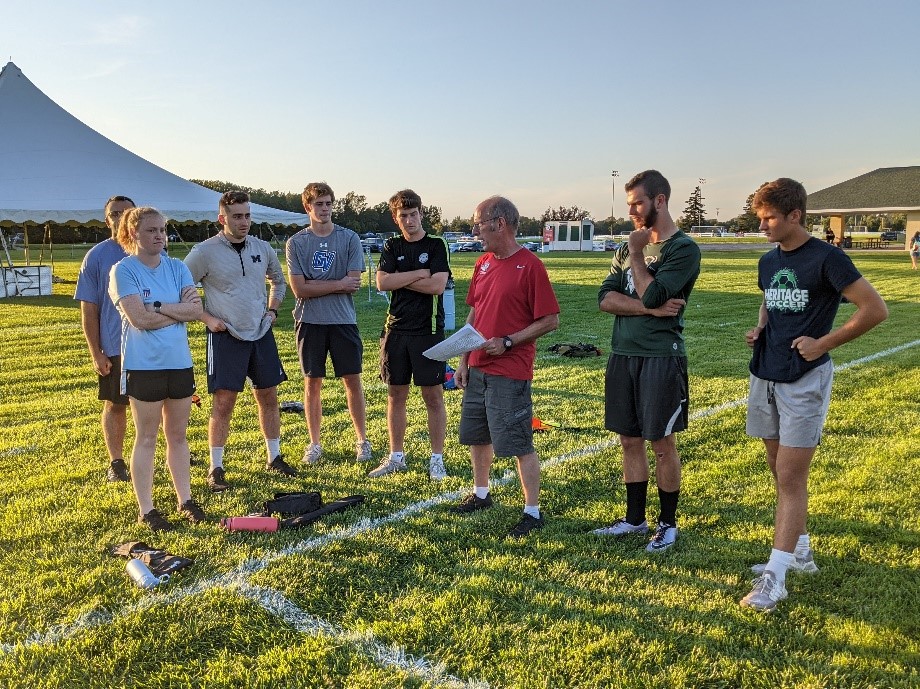
Although the pandemic has made it very difficult to host these in-person field training sessions, we learn by practicing in real life. Mentors were there to give immediate feedback about what the referees were doing well and what they could do better.
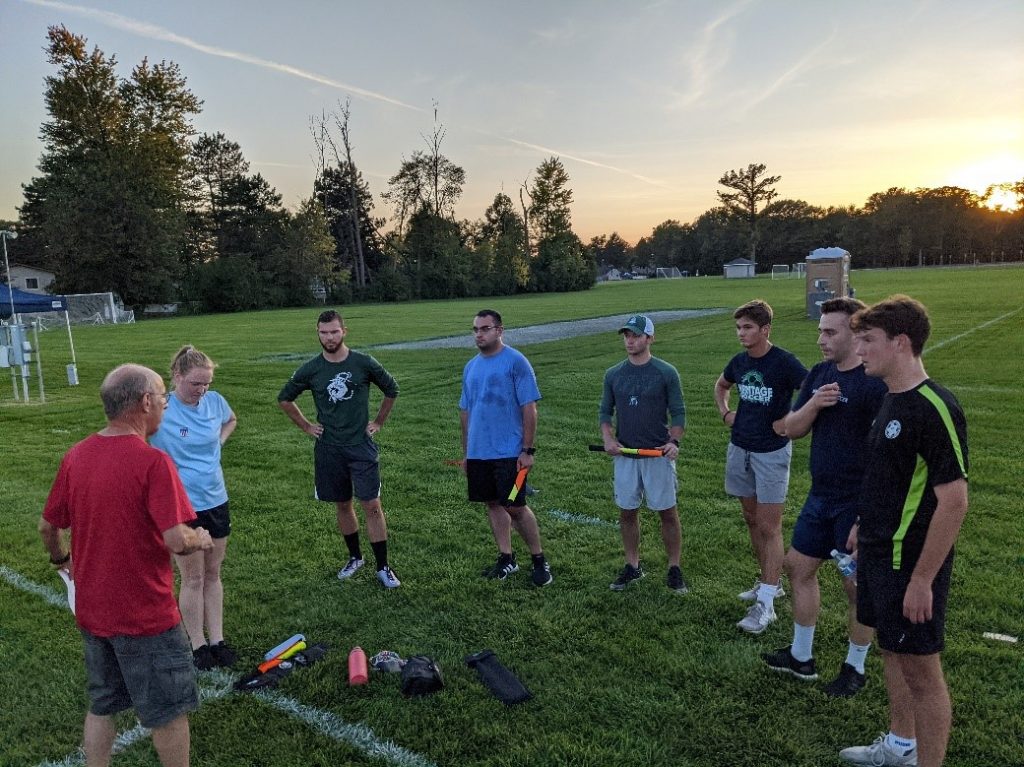
Last month, Bruce Falberg and Kevin Avery hosted a similar field session in northern Michigan. There are a few other districts planning to hold a session before the season ends. So please look for those opportunities and if you cannot find them but if you are interested in attending, please contact us.
Interview with Mike Wint
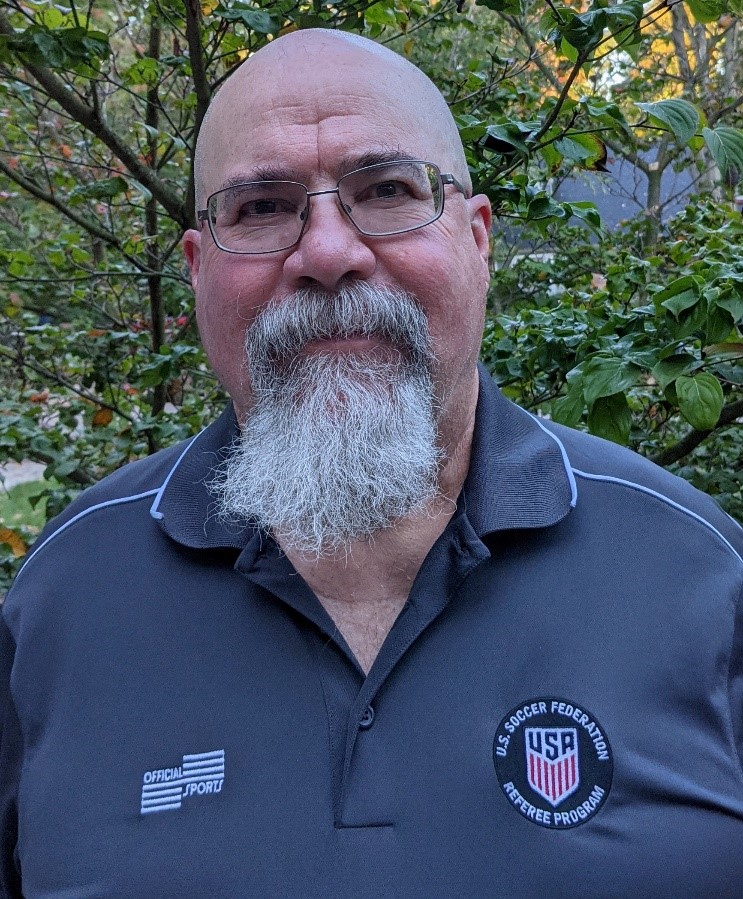
Referee Mentor and Former State Director of Instruction
For the November newsletter, we also had an opportunity to interview Mike Wint, a former State Director of Instruction.
When and how did you become the SDI of Michigan? How long were you the SDI?
I was the Grand Rapids District Director of Instruction (DDI) as the MRC was looking for a way to lighten the paperwork load and expense involved with paper-based written tests. I was involved with some database documentation systems at Amway and answered a few questions for Carlos. Our first online testing thing lasted about a year, then the move to GameOfficials. I was asked to move up to SDI to help fill the online testing gap when Brian Barre, my predecessor, stepped down after knee issues impacted his referee career.
How were you involved in Michigan soccer before you were the SDI?
I was an instructor, then added assessor and DDI for the MRC, as well as a Grade 7 referee.
What did you enjoy the most about being the SDI?
Working with the referees and instructors. When you help clear confusion by answering a law question or explaining how a situation should be interpreted you can almost see a light come on behind someone’s eyes. Helping others is really invigorating.
What is your referee background? When did you start refereeing?
I started refereeing in 1993 in AYSO. I had coached while living in New Jersey, my son played. I was “tricked” into taking the referee course when I registered my son after moving to Michigan, and decided refereeing was more fun than coaching. I am a AYSO National Referee, National Assessor, and National Referee Instructor. I did 20 years of high school soccer (got the plaque) and refereed NAIA and NCAA II and III with NISOA, retiring at 55.
Do you still remain active in the refereeing world? If so, how?
I am a U.S. Soccer Referee Mentor. I still assist the MRC in any way I can (mostly GameOfficials stuff) and am an administrator with the Grand Valley Soccer Officials Association.
What is your best memory of being a referee?
So many. A weeklong soccer tournament and training session in St Croix, Virgin Islands, for AYSO – my wife enjoyed the island while I enjoyed the games. Working “tough” games and relaxing after the game with the crew and talking out what worked and what didn’t. Outrunning an 8-year-old who kept dribbling off the end of the field (heading for a busy parking lot), trapping the ball, and giving it a small push pass towards the field. She did a quick 180, picked up where she had left off, and dribbled back onto the field. All picked up where it had stopped.
What is your best memory of being the SDI?
How hard the MRC members work for the good of the referees and the game in Michigan. I have experienced what some other states do, and can truthfully say that Michigan has one of the top referee committees in the federation.
What made refereeing exciting/fun for you?
I don’t play golf, tennis, chess or bowl, so my “sport” has been refereeing. I love the challenge of getting to the right place to see what is going on, anticipating the next ball and player movement, and making the right judgements. The teamwork with the crew makes me feel good, and getting it right makes the drive home worth it.
What do you like to do when you are not involved in soccer?
I retired from AMWAY at the end of August (Process Engineer in Technology Transfer), so I have been unpacking boxes from my office and starting on the “honey do” list my wife has been kind enough to provide. I have a small hobby metal shop in the garage that lets me play, unleash my inner engineer.
Do you have any advice for aspiring referees?
Your assigner is your best friend. If you do a good job and take care of them, they will take care of you. That means keep your availability up to date, accept assignments as soon as you see them (check frequently). When an assigner reaches out and you can help, do so. You are going to learn a lot, so be prepared. Ask your partners (think of them as teammates) questions. Remember, there is often more than one right answer. And enjoy yourself.
Say Hello to Luna and Lily!
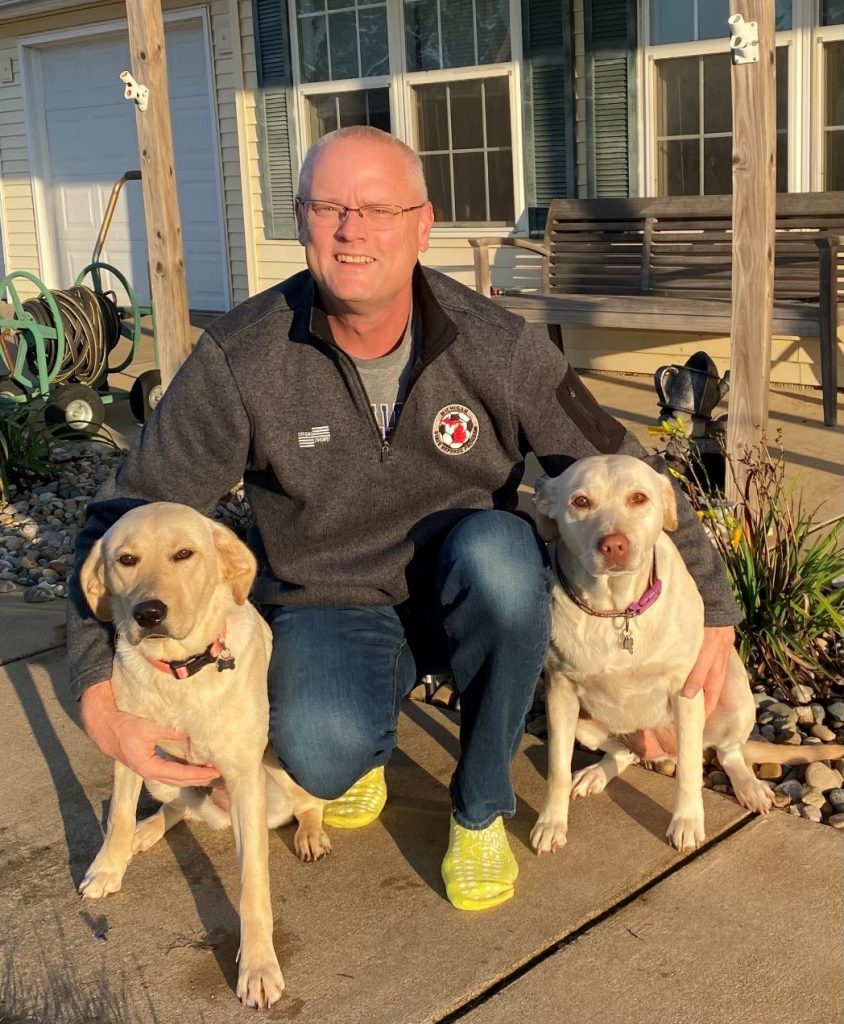
Luna and Lily DeBrabander
What are your names? How old are you? And what breed are you?
Our names are Luna (pink nose) and Lily (black nose), we are 4 years old and 9 months old respectively. We are both Yellow Labrador Retrievers.
How long have you known Jim? How did you meet him?
We have both known “Dad” since we were 8 weeks old. He found both of us after we were born and brought us home to be his and the families forever fur babies.
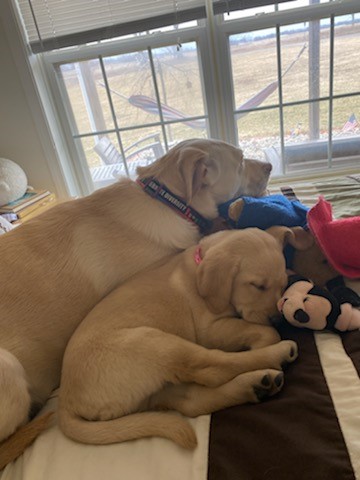
Do you ever go watch him referee?
We would love to watch our daddy referee but most places won’t let us in, which is sad. We would also love the opportunity to chase that soccer ball around the field!!
What do you do while Jim is reffing if you don’t go along?
We stay home with our mum and our brothers and sisters (we have a lot). Sometimes we get to go for rides around the countryside where we live! When dad is gone, Mum always gives us a Frosty Paw treat and cuddles so we don’t get too sad and lonely. We always wait up for him to come home, no matter how late it is.
Do you help him pack him ref bag?
Even though we think we are well-behaved pups, we do enjoy stealing socks, especially the long black ones with the white stripes. He doesn’t like it very much though!
Do you ever help Jim train for reffing?
Sometimes we go for a long walk or a run with him when it’s time to get in shape for referee season. When he is doing online training or teaching, we hang out with him just in case we get a good chin scratch or a belly rub. We think it’s helps with his concentration!
Have you ever chewed up any ref gear of his?
No, we like to save our energy for chewing our toys, the sofa, the walls and other fun, tasty things at the house; and soccer balls, of course.
Can you do a trick? If so, what can you do?
We both love to fetch a ball, we can sit, wait, and lay down. We also shake paws. One of Lily’s best tricks is wandering out to the cornfield and pretending she is lost and freaking the family out!
We are also really good at guarding the property. We’ve decided that anything on the road is a danger to our family, so we dutifully alert them if anything moves or looks suspicious.
What is your favorite toy?
Luna: My favorite toy is a stuffed turkey I got last Thanksgiving. I like to bring it to guests to show it off!
Lily: I love anything with a squeaker in it. The louder the better!!!
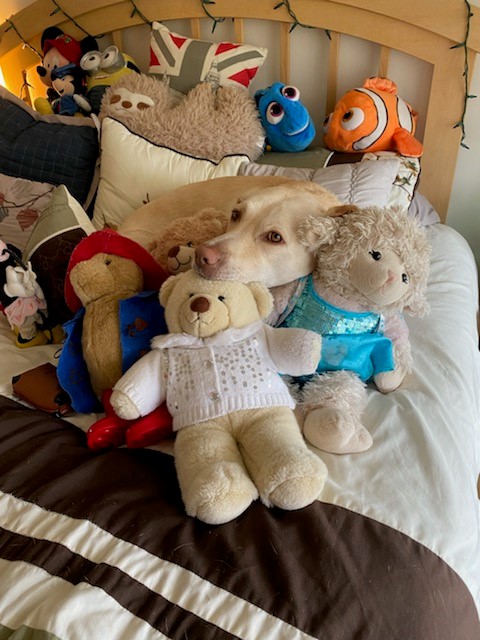
What is your favorite treat?
We always get a small bone in the morning when mum has her tea. But, our favorite treat is definitely Frosty Paws in the afternoon, and a Better Belly Bone at bed time. We are pretty spoiled.
What is your favorite game to play with Jim?
Fetch is the best, he usually gets tired before Lily does. We also really love playing tug with a toy!
What do you enjoy about Jim being a referee?
When he comes home from games and is so excited to see us. Sometimes he brings dinner home and our Mum will give us a bite!
What don’t you enjoy about Jim being a referee?
He is gone a lot and we miss him. We understand that he is doing something good for others though.
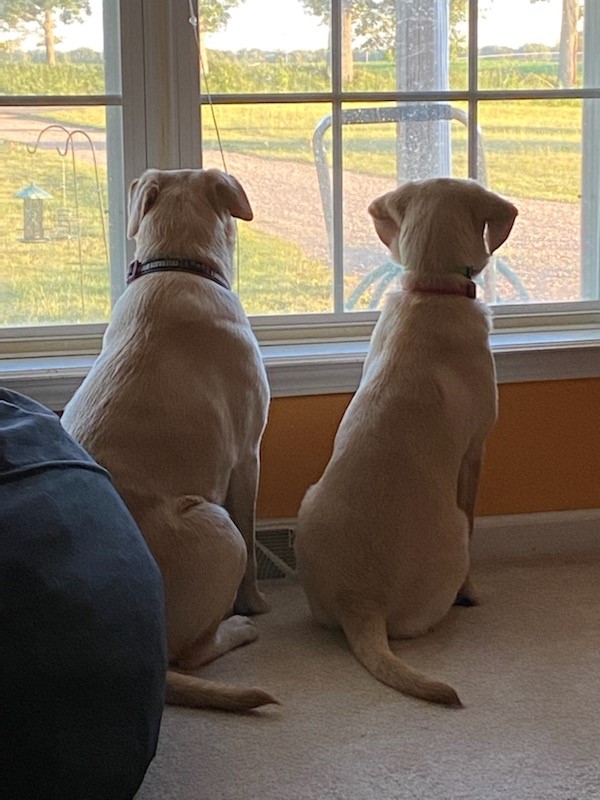
What is something unique that you do?
Luna: Mum and Dad have a lot of stuffed animals on their bed and I like to hide myself in them, and then they think I am lost!
Lily: I can dig huge holes in the yard and I am also great at catching little critters!
What do you like to do when Jim is not reffing?
We both like to play fetch, go for walks, and (especially) rides in the car. We both love to be petted, especially belly rubs and ear scratches. We love it when Dad is home! We also like to go with dad and visit mum at work; in the Dark Horse Brewery Beer Garten.
Our Mentor Candidates
Every year, some referee mentors retire from their role. While it is sad to see people move away from the mentor community, we are also grateful that new mentors join us. Right now, six mentor candidates are going through the mentor licensing process with the U.S. Soccer. They are: Dean Kimmith, Brad Heers, Kerry Martenis, Jake Brochu, Steve McGuirk, and Larry Olsen. As many of you may know, Dean was the State Director of Assessment until last year. He has a lot of experience. You may have seen Brad ref with his son Justus. Kerry has officiated at State Cup finals and out-of-state tournaments including in Massachusetts. Jake has been officiating at a very high level, including NISA. Steve has been involved in soccer for many years and many of you probably know him well in many different capacities. Larry has been an active member of the refereeing community, especially in the west side of the state.
These six candidates will complete both U.S. Soccer online training and three practical evaluations conducted by the MRC. We expect them to be licensed as mentors by February 2022.
Mentoring at State Cup
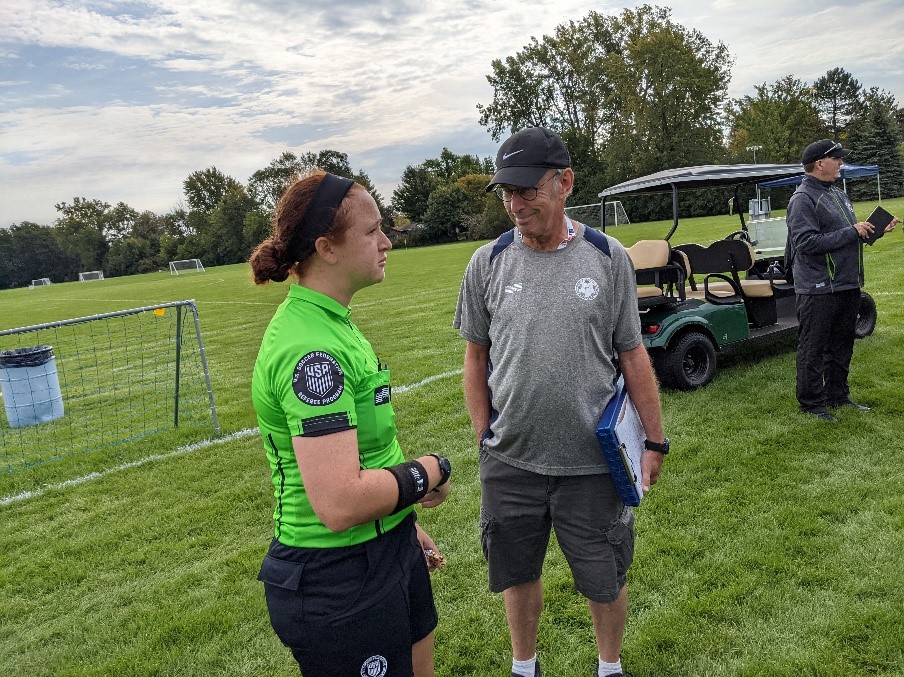
As mentioned above, on Friday during the State Cup quarter and semi final weekend, we hosted a field session. On Saturday and Sunday, about three quarters of games were observed by a referee mentor or a referee coach. Unlike so-called “assessments,” these mentoring opportunities are developmental. In other words, rather than mentors providing a laundry list of positives and negatives, they were encouraged to have a dialogue with referees. Through discussion, mentors would guide the referees so that they can come up with a way to do better on a next match or why what they did was a good practice.
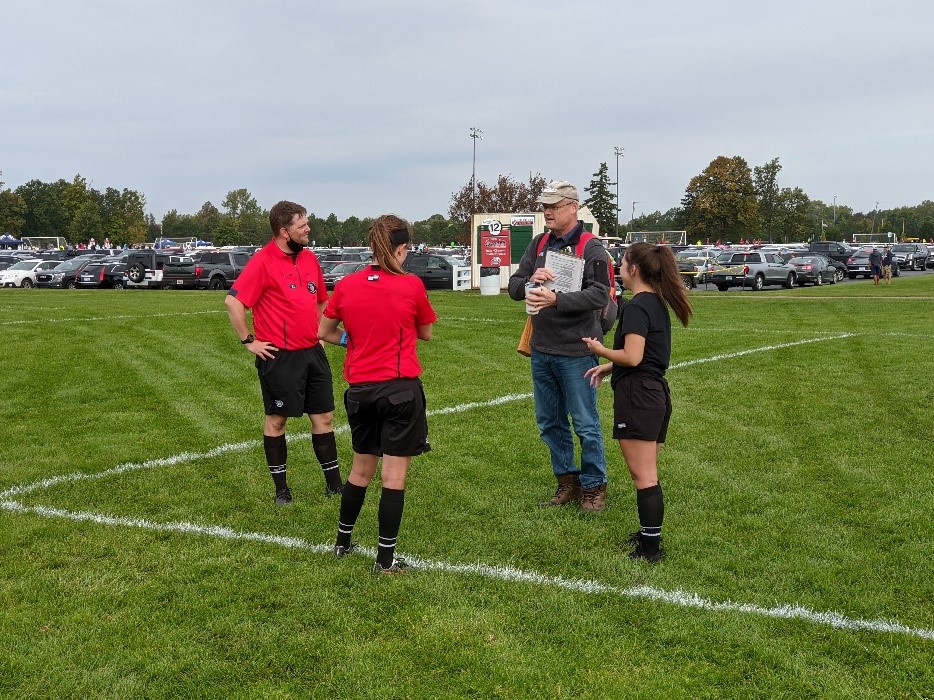
If you would like to have a mentor on your game, please feel free to reach out to us. We will assign a mentor to your match so you can learn from them and you can become a better referee on your next game.
Look for Training Opportunities
As we approach the end of the fall season, we will see many referee training opportunities. The MRC will offer numerous zoom sessions about various topics. Your local associations may offer some training opportunities. Please feel free to reach out to your local association or anyone in the MRC if you would like to be a part of referee training.
State Cup Experience
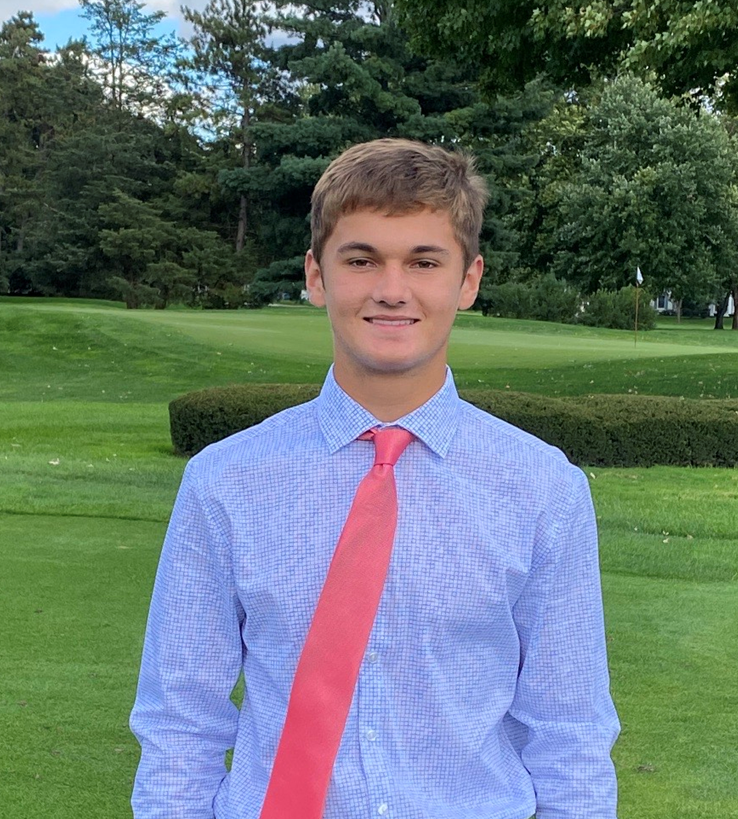
Grassroots Referee
A few weekends ago, I was given an opportunity to officiate at MSYSA State Cup in Saginaw, MI. I had gone to two previous State Cups, however, at this one I learned so much more about officiating.
The weekend started off on Friday with a field training session. This was a great learning experience where I was able to fine tune my mechanics, and meet high level referees from across the state and spark conversation. One of the great things about State Cup is being introduced to so many people that love the game as much as you do.
On Saturday, I had a U16 AR, U15 AR, and a U14 AR. The most exciting game that day was the U14 AR. It was the last game of the day and both teams scored early in the first half making it 1-1. After many chances, the game ended 1-1 in regulation time, time for overtime! Both teams were scoreless, and it went to my first ever kicks from the mark as an official. After 7 rounds of kicks from the mark, the score was still even. In the 8th round, the keeper makes an incredible save to help her team advance to the state semi-finals.
On Sunday, I was given my first State Cup center. The experience of officiating a high-quality match was a big step for my career as a referee. Feedback after the game was very helpful and informative to help elevate me as an official.
Being able to learn and be assessed by the state’s best officials is an experience that I would recommend to any young referee looking to improve their knowledge and experience of officiating.
What is Your Call?
In the October newsletter, you were given a clip that showed the ball hitting the referee. The survey asked you to identify what action would have to be taken.
The October video was this.
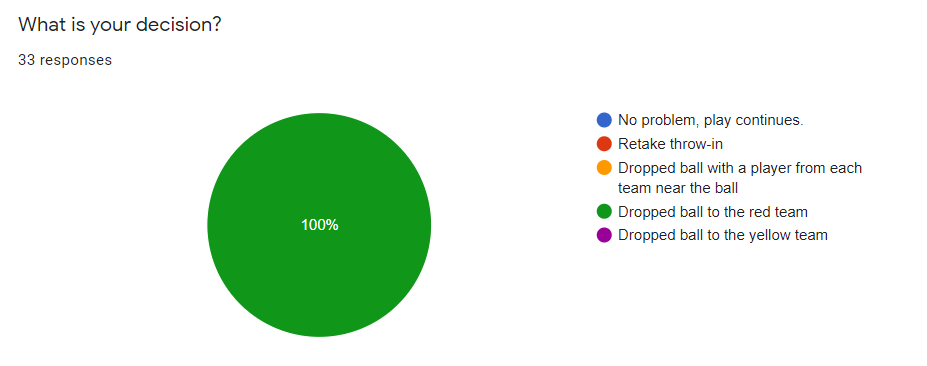
Everyone got the answer correctly! Congratulations!
The ball was last played by the red team. It then hits the referee. The ball possession would change to the yellow team. As the law states, if the ball hits a match official (it can be an AR), remains on the field of play, and one of the following three things happens, the play is stopped and restarted with a dropped ball.
- A team starts a promising attack
- The ball goes directly into the goal
- The team in possession of the ball changes
In this video, we had #3. Remember that the ball needs to stay on the field for a dropped ball to take place. In other words, if the ball hits the referee and goes over a touchline or a goal line, even though the restart (throw-in, CK, or GK) will be taken by the team that did not have the possession of the ball before the ball made contact with the referee, the restart would be a throw-in, CK, or GK, and not a dropped ball.
This month, we will talk about a possible handball. Please watch the video and decide what your decision might be. You can find the video here.
You can submit your answer here.
Who’s Who in Michigan: Stan Krajkowski
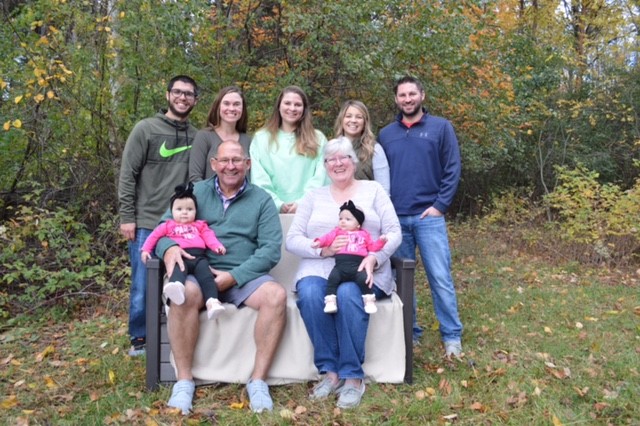
Referee Mentor
This month, we interviewed Stan Krajkowski. He has been officiating for almost 40 years and he also helps referee development as a mentor.
When did you start officiating? Why?
I started officiating unofficially in 1974. I was a player at Delta College and our coach asked if we would be interested in helping the local community to ref games. At that time there were very few refs in the Tri-City area. As college players we were more educated in the laws of the game than most of the coaches, parents, and players. The young players would stay after the games to ask questions and of course we would be able to show off some skills in a pickup game. In 1982 I became a USSF referee. Several years later I also began refereeing high school games. Looking back on all this, I realize now that I did want to become a referee and I do want to be a part of the progression of the game
What do you enjoy the most about officiating?
I enjoy the many referees I have met along the way. I also enjoy meeting new referees. The friendships of these referees is the best. Respect goes both ways in soccer. You have to earn respect for the player and coaches in order to be respected by them.
To go out on a field and be able to talk to players with the understanding that a fair game will be called. But the biggest pleasure of being a referee is having new referees come to me for advice. The young referee taking on more challenging games and watching referees that are from the MRC being selected to do collegiate, professional, and national level games.
As I grow older, talking to a referee after a match usually ends with a bit of reminiscing from years past.
How do you remain engaged in the refereeing world these days?
I stay engaged with our referee community in many different ways. I am still a USSF referee and accept assignments. I am a certified USSF assignor for the Saginaw area.
I wanted to become more engaged with referees so many years ago I became a USSF instructor. I enjoy instructing new referees and seasoned referees during their advancement progress. Just this past year, with the support of MRC, I was able to become a USSF mentor.
What do you do when you are not on the field?
My wife and I have a son and two daughters and a daughter in law and son in law. We also have two beautiful, fun-loving granddaughters. If I’m not at the soccer field, then those two have me wrapped around their finger. I also enjoy camping, gardening, building projects, remodeling and sitting by a good campfire.
I still watch soccer on TV or attend a game be it national, professional, collegiate, club, or high school level.
What advice do you have for aspiring referees?
Know your responsibilities. Your whistle is a tool, use it.
Be confident in decisions/actions/voice and posture.
Communicate with AR’s and players.
Stay fit.
Advancement – take your game to the next level. The MRC is here to support you.
As a mentor and fellow referee, know that I am here to support, nurture and protect you through your career. The MRC and I have your back.
Not sure when/if the end is near, but I do want to make sure if a referee wants to advance, I am there for them. These days our new/young referees need support, feedback to move on.
Thank you, Stan.
Thank you.
Michigan Referee Committee
State Referee Administrator (SRA): Carlos Folino
State Referee Chairman (SRC): James Wheeler
State Youth Referee Administrator (SYRA): Ronald Grobbel
State Director of Referee Development (SDRD): Yuya Kiuchi
State Director of Assignors (SDoA): John Corbett
State Director of Futsal (SDF): Richard Gilbert
Manager of Performance Observation (mgr.observation): Tim Deters
Manager of Field Sessions (mgr.field): Jeff Dornseifer
Manager of Video Analysis (mgr.video): Nichole Kramer-Kiuchi
Manager of Pedagogy (mgr.pedagogy): Kalani Burghard
Email addresses are the title in parenthesis plus @michiganrefs.org
Please reach out to us!
If you have any referee-related stories to share or someone you think should be featured in this newsletter, please reach out to us at sdi@michiganrefs.org.
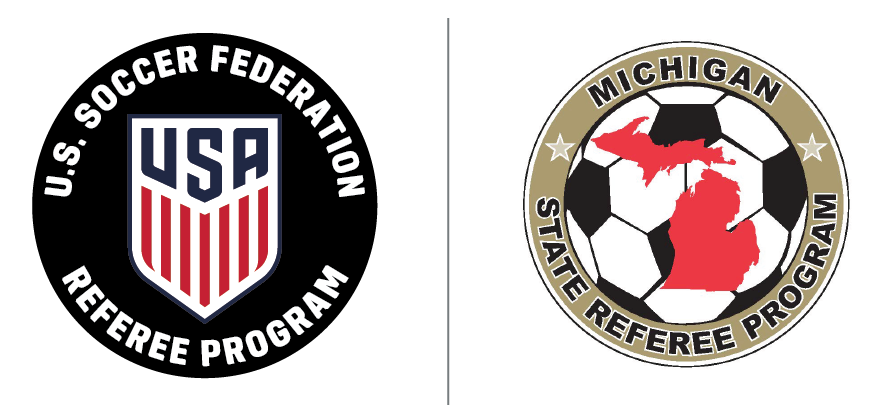
MRC announcements
If you know anyone who would like to become a referee, we offer numerous grassroots referee classes, as well. You can find relevant information here.
Contact one of us on the Michigan Referee Committee if you have any questions.


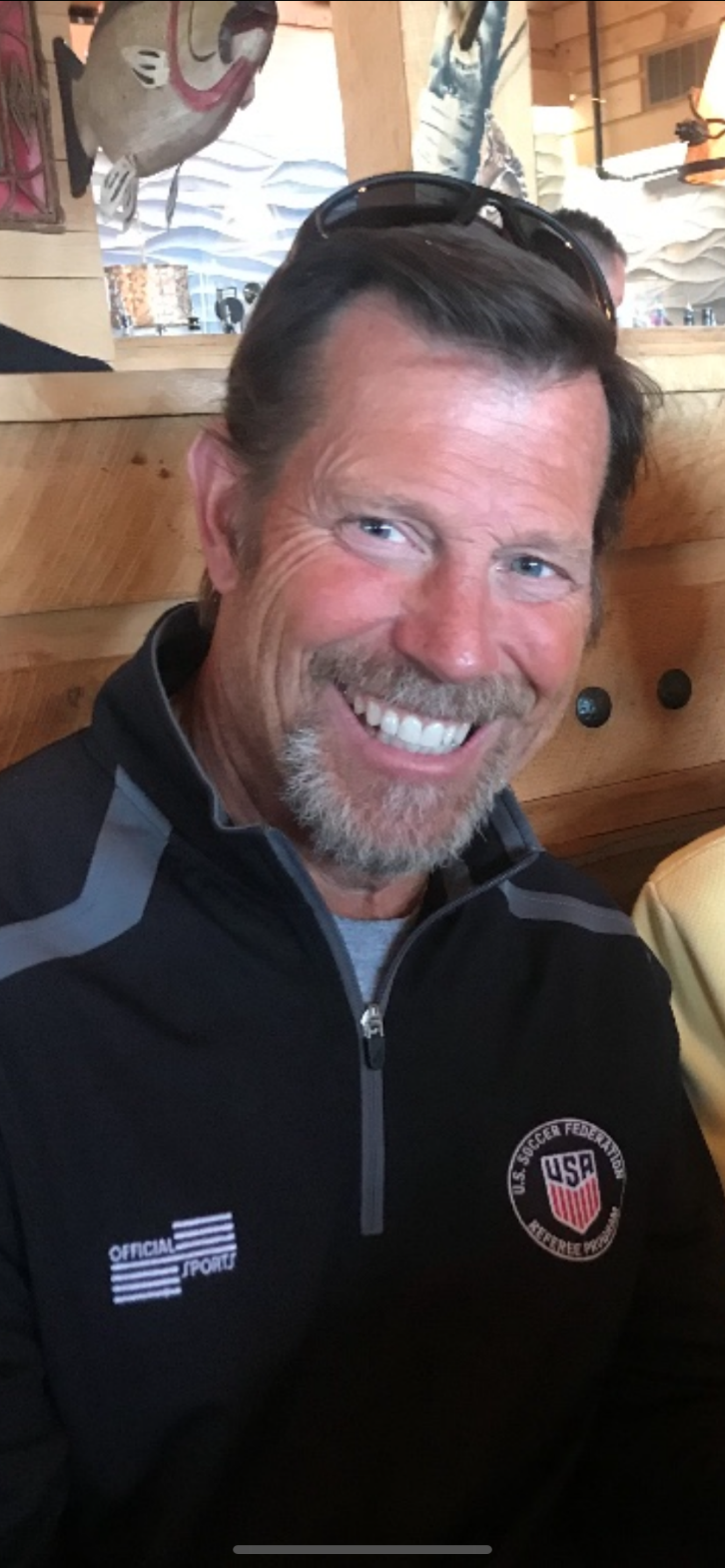
No Comments
Sorry, the comment form is closed at this time.